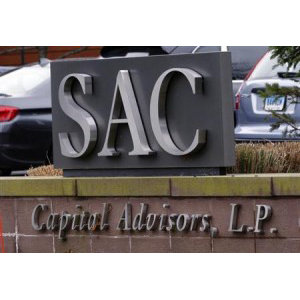 SAC Capital, a hedge fund prosecuted with insider-trading charges in New York, has reached a tentative deal with federal prosecutors to settle the case and pay more than $1 billion in fines and forfeitures, which would be the largest penalty of its kind.
SAC Capital, a hedge fund prosecuted with insider-trading charges in New York, has reached a tentative deal with federal prosecutors to settle the case and pay more than $1 billion in fines and forfeitures, which would be the largest penalty of its kind.
A deal is expected to include requiring the fund to plead guilty to criminal misconduct, to agree to stop managing outside money and to pay more than $1 billion in penalties, a record for an insider trading prosecution.
The exact amount SAC would pay is not known, but prosecutors had been seeking a $1.8 billion penalty. The settlement was first reported Thursday by The Wall Street Journal.
SAC, run by billionaire investor Steven A. Cohen, was charged with insider trading in July in what was considered a rare criminal action against a large corporation. The company denied the charges at the time.
Federal prosecutors and the FBI, in announcing the indictment, called the fund “a magnet for market cheaters.”
Preet Bharara, the U.S. attorney for the Southern District of New York, said SAC’s insider-trading schemes were “substantial, pervasive and on a scale without known precedent in the history of hedge funds.”
Michael Steinberg and Mathew Martoma, two of Cohen’s former employees, are facing trial on criminal insider trading charges. Six former SAC employees have pleaded guilty to insider trading while at the fund; two others — Michael S. Steinberg and Mathew Martoma — are set to stand trial in the coming months.
Cohen himself was not criminally charged but he faces a separate lawsuit from the Securities and Exchange Commission, which accused him of failing to reasonably supervise employees who were accused of insider trading.
Officials at the Securities and Exchange Commission, in suing him for failed supervision, said they would seek to bar him from the securities industry, which would put an end to much of his trading.
Even though Cohen has assured his team of traders that the investigation would not affect its business, on Tuesday SAC announced that it would shut down its London operations by the end of the year.
With more than 50 people, the London office is one of the firm’s largest branches outside of its Stamford, Conn., headquarters. In addition, the fund cut six portfolio management teams based in the United States, according to an internal memo sent to employees.
“As our negotiations with the government have unfolded, it has become clear to us that the outcome the government is demanding is likely to have a greater than first anticipated impact on the firm,” Tom Conheeney, SAC’s president, said in the memo.
He added: “We have concluded that we must operate as a simpler firm and reduce our capital allocations.”
SAC’s aggressive trading style, combined with its immense buying power, made the fund, year after year, one of the top commission-payers on Wall Street.
At its peak, including borrowings, SAC had more than $50 billion in assets under management and paid out hundreds of millions in dollars of annual trading commissions. It has also been a top client of the so-called prime brokerage units of banks like Goldman Sachs and Morgan Stanley, which have provided financing services to the fund.
